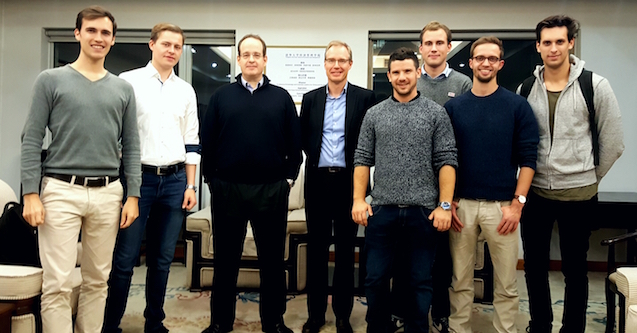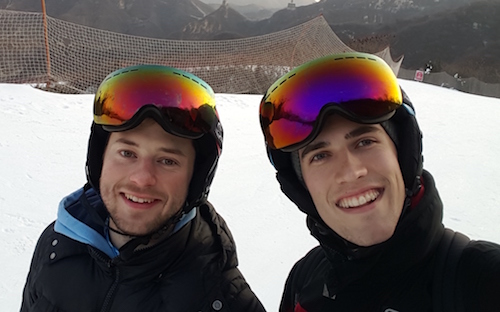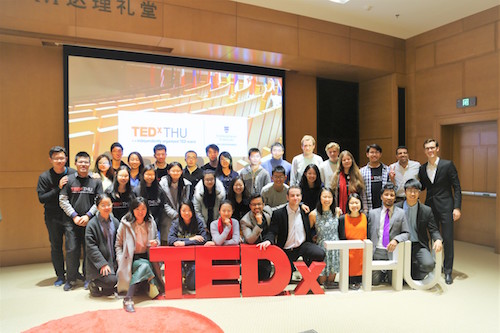Roman Schopphoff, Visiting SEM Exchange Student
There
are plenty of reasons you can find on Google (or Baidu) as to why Tsinghua
should be your choice for your next semester. It is one of the best
universities in China, and it provides broad opportunities and is packed with
international students (3000+ is the latest figure I have read). You will be surrounded
by bright minds, in very personal class sizes, at a world-class school of economics
and management. The list goes on.
In
the following sections, however, I would like to provide a frank and personal
(re)view of my experience in the Global MBA Exchange program during Fall 2016 –
compressed as best I can. And why is it eight (八个)? Well, meaning and numbers play an important role in the Chinese
culture and daily life. If you aren’t aware of it as an incoming student, you
will be soon – when you are desperately searching for a fourth floor, for
example, until you realize there simply isn’t any, like me.
1. Hatchery of Innovation and Ingenuity – Often referred to as the “Chinese Silicon Valley,” Zhongguancun (中关村), located right around the corner from Tsinghua, has plenty
of incubators, laboratories, and opportunities for funding; Tsinghua has earned
the title of The Entrepreneurial University. Okay, I must admit that studying
may take up time due to mandatory assignments, group work, and labs, but China
– and in particular Tsinghua University – is unbelievably progressive and technology-oriented.
I took courses titled, “Business Innovation in an Interconnected World,”
“Leadership in a New Era,” and “Technology Driven Business Innovation,” all of
which had in common to address creative collaboration among students, bubbling
over with ideas. Professors and guest speakers not only invited but pushed for
a dialogue, critical questions, and fresh perspectives.
2. Ideal Study Environment – On campus and beyond. Not everyone, but still a great number of students,
were given the chance to live on campus. For others, the Haidian area proved to
be another welcome option. There’s a weekly room service at the dorms and
literally any service right on campus. Hence, I was even told by some fellow
students that they couldn’t even remember the last time they had left campus.
But I can add more: Tsinghua School of Economics and Management and its Global
MBA program offer many fully equipped and of course air-conditioned lecture
rooms (at any season of the year). Libraries are plentifully available for both
group and individual work. I do remember very well, when the days started to
become shorter (and temperatures drop quite abruptly in Beijing’s late autumn),
many from my cohort were daily craving for the cozy and well-equipped lecture
rooms of SEM.

Enjoying exchange
life with fellow expatriates.
3. TEDx – I guess this
one is relatively self-explanatory. I had the honor of hosting the 2016 TEDxTHU
Winter Conference. One of my most intense experiences, I won’t soon forget it.
The atmosphere, the speakers, the topics … the incredible team of students
organizing it. It was a true TED experience.
4. Plenty of Great Job Opportunities – And not only after but, for some, even during their studies. Even as
an exchange student, I have received great support from Tsinghua SEM’s Career
Development Center. They share weekly job openings, offer help with application
questions, and organize an endless number of job fairs and informal get-to-know-you
sessions with head-hunters and recruiters from all sorts of firms – be it a
local start-up or a global player. I can say this with confidence, because I
have also taken the chance to gain valuable work experience. I served in an
internship at a high-tech startup for consulting and investment in the particularly
relevant fields of automotive and smart cities, during which time I also got to
work together with multinational clients in Beijing’s Wangjing (望京) and Zhongguancun as well as the neighboring city of
Tianjin. Gaining an understanding of the Chinese work environment, the local way
of running a business, and the vital nature of government relations – I am
grateful for all of this. Tsinghua University truly enabled and supported that
growth.
5. Great Place to Take Some Time Off – Aside from studying hard. Yes, there are plenty of free-time options.
Simply check out the list of student clubs – in font size 10 it does not even
fit a regular A4 piece of paper! Beautiful parks are located all around campus
(and it’s actually fair to say that the campus itself is one). The countryside
surrounding Beijing has plenty to see. I can personally recommend that you
check out the Great Wall of China and the mountains arising just behind the
Summer Palace (颐和园), and if you love skiing: the THU Ski Club takes you on weekly trips to
great ski resorts, one of which is even located right at the Chinese Great
Wall. Did I mention that you can rent all your gear – right down to goggles and
gloves – for a fair price?

Taking advantage of
glorious distractions from academic life, thanks to the THU Ski Club.
6. Located (Almost) at the Seaside – Taking 34 min for a ride by bullet train to Tianjin (天津). It’s no secret that Tianjin and China’s capital
grow slowly but surely together. This convergence will also spread out some of the
factories that cause negative or unsightly externalities. Interesting fact at
this point: the Chinese high-speed railway network encompasses some 22,000
kilometers. That is around half of all the world's high-speed rail tracks
combined. And Beijing, with its multiple high-speed railway stations, is
perfectly connected to any major destination across China. Depending on
destination, flying will often take a longer time, due to the security check,
than many trips by train.
7. The Schwarzman Scholars – Taking the Tsinghua experience to yet another level. Being involved in the
student association which plans the on-campus TEDx events, we came up with the
idea to have a unique TEDx Salon event. The Schwarzman Scholars go through an
intensive one-year program and enjoy the luxury of being accommodated in a
freshly inaugurated, well-wrought, and beautiful architectural space. We
invited eight of the first-ever 100+ Scholars to give a talk at our Salon event.
“Pushing Boundaries,” the title of the event, did not overpromise but rather overdelivered.
For example, one of the Scholars founded seven different restaurants when she
was an international student at Yale University. Although she studied
neuroscience, she embodies the principles of entrepreneurship and has pushed her
own boundaries by not only being a foreign student in the U.S. but also
navigating the difficulties of being a woman in her field. Or consider the
story of another Scholar, representing yet another incredible life story: having
grown up in very difficult conditions in a rural country, he fought his way to
a scholarship at an international school in another, more developed country.
There, he understood the importance of education, and, by the time of the Salon
event, he had already built eight fully functioning schools in his home country
to educate the underserved, rural children. Those two alone already exceed any
standard scale; I felt both humbled and blessed to share a stage with them as
MC of this magnificent event. If you read this ahead of your semester at
Tsinghua University, make sure to pay a visit to the Schwarzman College. It is
filled with great people, always open-hearted and happy to make new friends.

Group TEDxTHU
Conference photo after successfully hosting as Conference MC.
8. The City of Beijing – Obviously, all Beijing universities share that advantage. However, I feel it
is absolutely worth noting. You may ask, how should I judge the advantages of
location? I’ve spent about half a year abroad in North America, enjoyed another
period in Denmark, and traveled pretty much all around Europe, and the list of
my Asia travels includes Thailand, Vietnam, South Korea, and indeed the northern,
eastern, western, and southern regions of China (i.e., Hangzhou, Suzhou,
Nanjing, Shanghai (twice – yes, I really enjoyed the time there), Shenyang,
Tangshan, Baishan (North Korean border), Dalian, the “three-million-person-village”
Bengbu (a couple of times), Xi’an, Hong Kong, Shenzhen, and Guangzhou). I can
confidently say that Beijing is unique compared with any other place in China
or around the globe. I believe what accounts for its uniqueness links to
pluralism (so many of its inhabitants come from outside Beijing) balanced with
a certain unity, a concentration of politics and businesses, and an endless
number of districts in which you will find tradition mixed with modernity. I
could keep going with many more aspects and paradoxes, but the best way of
getting a comprehensive understanding is clearly by going and living there. My
recommendation: if you go to Beijing and Tsinghua, dive right in early and
experience it to its fullest.